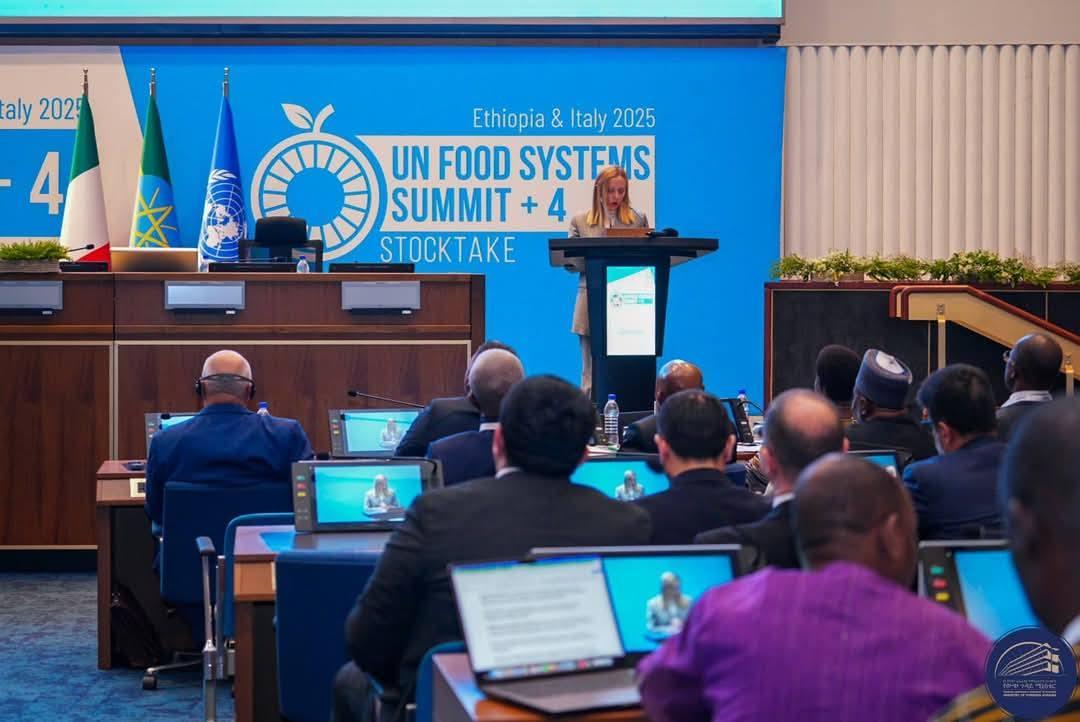Africa-Press – Ethiopia. Italian Prime Minister Giorgia Meloni underscored that the momentous challenge that is the subject of our works today, which is food security.
Speaking at the 2nd United Nations Food Systems Summit Stocktake (UNFSS+4), kicked off in Addis Ababa, the Prime Minister said that the first time that this Summit is being held in Africa.
“We chose to co-organize this event in Addis Ababa with the Ethiopian government, not only because Italy has a special relationship with Ethiopia and a pragmatic cooperation based on concrete projects and initiatives, but also because we believe it is essential to involve the African continent as a protagonist in the choices and actions of the international community,” she said.
Accoriding to the PM, with the momentous challenge that is the subject of our work today: food security.
This is a top priority challenge, as demonstrated by the broad and qualified participation in this Summit and the presence of UN Deputy Secretary-General Mohammed, whom I greet and thank.”
Although it has drastically decreased over the last seventy years, PM Meloni revealed global food insecurity still affects around 10% of the world’s population.
According to her, this percentage is largely concentrated here in Africa, where one in five people suffer from hunger and do not have access to sufficient, safe, and nutritious food to lead a healthy life.
This situation, already complex, has been exacerbated by the crises the world is currently facing, he noted.
The Prime Minister further explained that while the efforts being intensified to overcome the shock of the pandemic, the world is dealing with Russia-Ukraine war, which disrupted economic and trade flows and processes, destabilized energy markets, and fuelled waves of inflation that hit the most fragile Nations, especially in the Global South and in Africa.
“And we know very well that when people do not have access to sufficient food or lose the means to produce it, the consequences can be catastrophic: poverty worsens, conflicts intensify, and communities become more vulnerable to violence, terrorism, or forced migration.”
In this regard, food insecurity is therefore, in its every aspect, a political issue, she said adding that but not only.
“It is also, and above all, an economic issue. We would be making a serious mistake if we limited ourselves to looking at food systems through the face of poverty, suffering, and hunger. Food systems are an engine of growth and development, both for the most fragile nations and for those that are economically more solid.”
Noting that the development for the communities at the heart, she stressed the necessary for that food to be marketed and have access to markets, with solid and resilient production and distribution chains.
“This is the only way we can enable a community to prosper with the resources it possesses, generating employment and stable, lasting growth,” Meloni noted.
This is Italy’s point of view, according to her.
“And it is the red line that links the initiatives and projects of the Mattei Plan for Africa. Starting, of course, with the agri-food sector, an area in which Italy can boast unique know-how that combines tradition and innovation.
We have made this heritage available to our African partners, and together with them we have built public-private partnerships that attract investments and guarantee concrete results.”
Her country is successfully testing this in Algeria, where we are working to reclaim over 36,000 hectares of desert to produce up to 40-45,000 tons of additional cereals and legumes per year, creating 6,000 jobs and generating benefits for over 600,000 people, she indicated.
This endeavour is also underway in Senegal, Ghana, and Congo, and aims to soon involve Côte d’Ivoire and, President William Ruto of Kenya, the PM pinted out.
“Our blueprint is also working in Tunisia, where we are strengthening capacities and skills for the use of water, a resource around which there will be an increasing geopolitical and sovereignty challenge.”
However, she said Italy’s goal is not to create dependency, but to support self-reliance.
This goal also involves what we usually refer to as “food sovereignty,” the right of people to shape their own production model based on their identity, she indicated.
“Food sovereignty means not going along with the standardization of food production—which lowers quality and concentrates wealth—but instead investing in promoting local, high-quality products.
Small and medium-sized farmers and their families are the backbone of agricultural and environmental systems. They are the primary guardians of the land and must be given the means to live with dignity, and with a fair recognition of their work.”
For More News And Analysis About Ethiopia Follow Africa-Press






